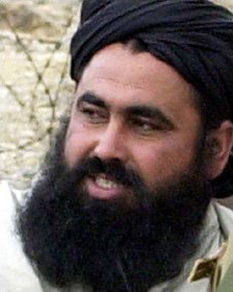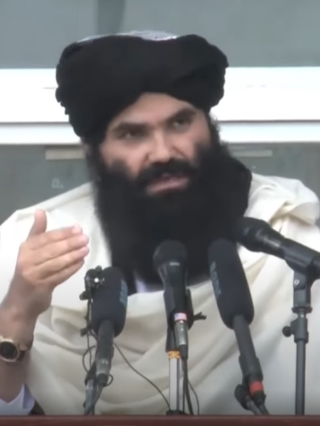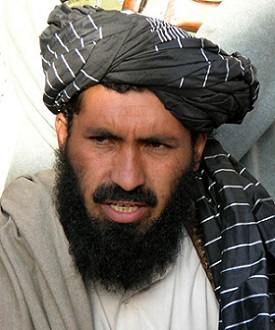Related Research Articles

The Islamic Movement of Uzbekistan was a militant Islamist group formed in 1998 by Islamic ideologue Tahir Yuldashev and former Soviet paratrooper Juma Namangani; both ethnic Uzbeks from the Fergana Valley. Its original objective was to overthrow President Islam Karimov of Uzbekistan and create an Islamic state under Sharia; however, in subsequent years, it reinvented itself as an ally of Al-Qaeda. The group also maintained relations with Afghan Taliban in 1990s. However, later on, relations between the Afghan Taliban and the IMU started declining.
Waziristan is a mountainous region covering the former FATA agencies of North Waziristan and South Waziristan which are now districts of Khyber Pakhtunkhwa province of Pakistan. Waziristan covers some 11,585 square kilometres (4,500 sq mi). The area is populated by ethnic Pashtuns. It is named after the Wazir and mehsud tribe. The language spoken in the valley is Pashto, predominantly the Waziri dialect. The region forms the southern part of Pakistan's Federally Administered Tribal Areas, which is now part of Khyber Pakhtunkhwa province. The 16th-century Pashtun revolutionary leader and warrior-poet Bayazid Pir Roshan, who wrote the oldest known book in Pashto, was based in Kaniguram, Waziristan.

Abdullah Mehsud was a Pashtun militant commander who killed himself with a hand grenade after security forces raided his dwelling in Zhob, Balochistan, Pakistan. He belonged to the Mahsud tribe.

Nek Muhammad Wazir was a prominent Pakistani mujahideen or jihadi leader. He was killed in a US drone strike in South Waziristan, FATA, Pakistan in 2004. This was the first CIA drone strike inside Pakistan.

Baitullah Mehsud was one of the founders and a leading member of the TTP in Waziristan, Pakistan, and the leader of the Tehrik-i-Taliban Pakistan (TTP). He formed the TTP from an alliance of about five militant groups in December 2007. He is thought by U.S. military analysts to have commanded up to 5,000 fighters and to have been behind numerous attacks in Pakistan including the assassination of Benazir Bhutto which he and others have denied.

Jalaluddin Haqqani was an Afghan insurgent commander who founded the Haqqani network, an insurgent group fighting in guerilla warfare against US-led NATO forces and the now former government of Afghanistan they support.
The Waziristan Accord was an agreement between the government of Pakistan and tribals resident in the Waziristan area to mutually cease hostilities in North Waziristan. The agreement was signed on 5 September 2006 in the North Waziristan town of Miranshah. The agreement effectively ended the Waziristan War, fought between the Pakistani military and rebels in the border region with ties to the Taliban and Al-Qaeda. However, recent attacks by the pro-Taliban militants suggest that the truce has been broken by the militants who attacked and killed 50 Pakistanis including soldiers and police. The attacks are also believed to have been as a retaliation for the Lal Masjid attacks by Pakistan Army.

Sirajuddin Haqqani is an Afghan warlord who is the first deputy leader of Afghanistan and the acting interior minister. He has been a deputy leader of the Taliban since 2015, and was additionally appointed to his ministerial role after the Taliban's victory over Western-backed forces in the 2001–2021 war. He has led the Haqqani network, a semi-autonomous paramilitary arm of the Taliban, since inheriting it from his father in 2018, and has primarily had military responsibilities within the Taliban.

The insurgency in Khyber Pakhtunkhwa, also known as the War in North-West Pakistan or Pakistan's war on terror, is an ongoing armed conflict involving Pakistan, and Islamist militant groups such as the Tehrik-i-Taliban Pakistan (TTP), Jundallah, Lashkar-e-Islam (LeI), TNSM, al-Qaeda, and their Central Asian allies such as the ISIL–Khorasan (ISIL), Islamic Movement of Uzbekistan, East Turkistan Movement, Emirate of Caucasus, and elements of organized crime. Formerly a war, it is now a low-level insurgency as of 2017.

The Pakistani Taliban, formally called the Tehreek-e-Taliban-e-Pakistan, is an umbrella organization of various Islamist armed militant groups operating along the Afghan–Pakistani border. Formed in 2007 by Baitullah Mehsud, its current leader is Noor Wali Mehsud, who has publicly pledged allegiance to the Afghan Taliban. The Pakistani Taliban share a common ideology with the Afghan Taliban and have assisted them in the 2001–2021 war, but the two groups have separate operation and command structures.

The Utmanzai or Utmanzai Wazir are a Sunni Muslim Pashtun tribe found in North Waziristan Agency, Pakistan.

The Haqqani network is an Afghan Islamist group, built around the family of the same name, that has used asymmetric warfare in Afghanistan to fight against Soviet forces in the 1980s, and US-led NATO forces and the Islamic Republic of Afghanistan government in the 21st century. It is recognized as a terrorist organization by the United Nations. It is considered to be a "semi-autonomous" offshoot of the Taliban. It has been most active in eastern Afghanistan and across the border in north-west Pakistan.

Qari Zainuddin Mehsud, commonly known as Qari Zain, was a citizen of Pakistan, a member of the Mehsud tribe, and a leader of the Tehrik-i-Taliban Pakistan in South Waziristan, one of Pakistan's Federally Administered Tribal Areas. Pakistan's Daily Times described him as the "self-appointed successor of Taliban commander Abdullah Mehsud" although he feuded with Baitullah Mehsud over leadership of the Pakistani Taliban. In the months before his assassination, the Pakistani government unofficially supported Zainuddin as a counter to Baitullah.

Maulvi Nazir was a leading militant of the Pakistani Taliban in South Waziristan. Nazir's operations were based in Wana.

The Operation Rah-e-Nijat was a strategic offensive military operation by the unified command of Pakistan Armed Forces against the Tehrik-i-Taliban Pakistan (TTP) and their extremist allies in the South Waziristan area of the Federally Administered Tribal Areas that began on June 19, 2009; a major ground-air offensive was subsequently launched on October 17. It became the integral part of the war in Western fronts which led to the encirclement and destruction of Taliban forces in the region, although the Taliban leadership escaped to lawless areas of neighboring Afghanistan.
Hafiz Gul Bahadur is the leader of a Pakistani Taliban faction based in North Waziristan. Upon the formation of the Tehrik-i-Taliban Pakistan (TTP) in December 2007, he was announced as the militant group's overall naib amir under Baitullah Mehsud, who was based in South Waziristan, but has largely distanced himself from the TTP due to rivalries with Mehsud and disagreements about the TTP's attacks against the Pakistani state.
The Datta Khel airstrike was an American airstrike carried out on 17 March 2011 in Datta Khel, North Waziristan that killed 44 people and led to widespread condemnation in Pakistan. Sherabat Khan Wazir, a top commander of Hafiz Gul Bahadur's Taliban faction, was killed in the strike, and in response Bahadur threatened to end the peace deal struck with the Pakistani government almost four years earlier. The airstrike was part of a long series of drone attacks in Pakistan carried out by the CIA and United States military. It occurred just two days after diyya, a form of compensation paid to a victim's family under Islamic law, was paid for the release of U.S. CIA operative Raymond Allen Davis, signaling a resumption of U.S. activity after a several week hiatus while Davis' pardon on murder charges was being negotiated.

Operation Zarb-e-Azb was a joint military offensive conducted by the Pakistan Armed Forces against various militant groups, including the Tehrik-i-Taliban Pakistan (TTP), the Islamic Movement of Uzbekistan, the East Turkestan Islamic Movement, Lashkar-e-Jhangvi, al-Qaeda, Jundallah and Lashkar-e-Islam. The operation was launched on 15 June 2014 in North Waziristan along the Pakistan-Afghanistan border as a renewed effort against militancy in the wake of the 8 June attack on Jinnah International Airport in Karachi, for which the TTP and the IMU claimed responsibility. As of 14 July 2014, the operation internally displaced about 929,859 people belonging to 80,302 families from North Waziristan.

Hafiz Saeed Khan, also known as Mullah Saeed Orakzai, was an Islamic militant who served as the Islamic State emir for its Khorasan province, which is active in Afghanistan and Pakistan, from January 2015 until his death in July 2016. Prior to 2015, Khan was a senior commander in the Tehrik-i-Taliban Pakistan and initially a member of the Afghan Taliban.
References
- 1 2 Roggio, Bill (5 September 2006). "Talibanistan: The Establishment of the Islamic Emirate of Waziristan". FDD's Long War Journal. Retrieved 24 September 2021.
- ↑ Sulaiman, Sadia (10 April 2009). "Hafiz Gul Bahadur: A Profile of the Leader of the North Waziristan Taliban" (PDF). Terrorism Monitor. Washington, DC: The Jamestown Foundation. 7 (9): 4–6. Archived from the original (PDF) on 28 July 2012. Retrieved 24 November 2013.
- ↑ Syed Saleem Shahzad (2 September 2006). "The knife at Pakistan's throat". Asia Times Online . Archived from the original on 19 October 2006.